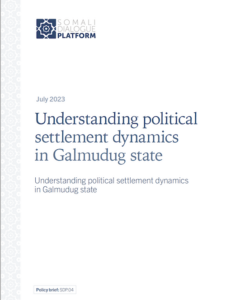Introduction
Galmudug state in Somalia was, until recently, seen as a region of conflict and fragmentation, shaped by the legacy of violence passed down from the Somali civil war. Due to the constant conflict between clan-based political groupings, it has been characterized as lacking any unified political authority. Even as other parts of Somalia established basic state structures and began forming what would become the Federal Member States (FMSs), Galmudug continued to be riven by rival efforts to establish administrations. The Galmudug state formation process, which concluded in 2015, was ultimately unable to secure buy-in from several armed groups, and as such violence remained central to the political order. This state of affairs was clearly in evidence when violence flared in 2020 around the most recent election process, and even more so in October 2021, when renewed conflict erupted between the state government administration and the Sufi group, Ahlu Sunna Waljama’a (ASWJ).
Despite this history of conflict, positive trends are increasingly apparent. The Galmudug administration has fewer internal rivals (such as ASWJ) and no competing administrations. Al-Shabaab has recently lost significant territory in the state and now controls only El Buur and Galhareri. The historically fractious relationship between Puntland and Galmudug, and related tensions around the town of Galkayo, which straddles the two states, have recently ebbed. District council formation processes are also going full steam across the state.
Even so, challenges remain. Many clans are armed and wield considerable autonomous power. Although weakened, al-Shabaab continues to pose a security threat to state authority. State sources of revenue and tax collection capacity are extremely limited, preventing the administration from expanding public services. In order to unpick Galmudug’s complex political trajectory and assess current dynamics, this brief employs a political settlement framework. Here, political settlement is understood to mean a shared understanding of and commitment to the exercise of power, in which political actors share basic agreement on which institutions hold what power, and how such power can be peacefully contested. As such, the fragmentation and violence that has long characterized Galmudug can be understood as the total absence of a political settlement. More recent positive trends, however, can be understood as opportunities to discuss, establish and clarify the rules of the game, thereby helping establish peaceful and lasting political dynamics. This brief seeks to provide an overview of these changing dynamics with a view to proposing solutions for Galmudug stakeholders going forward.
Find the Somali verison on this briefing here.
This briefing is a product of the Somali Dialogue Platform, a programme which supports Somalis to achieve consensus on contentious political issues and is implemented by the Rift Valley Institute. The Somali Dialogue Platform is funded by the UK Foreign, Commonwealth and Development Office (FCDO), the Ministry of Foreign Affairs of Denmark, and the United States Agency for International Development (USAID).




